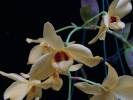|
|
|
|
 |
Email Address Recovery or Password Reset |
Use our Change Password page, and you can set a new password, or if you don't remember which email address you
registered with, the same page may be able to suggest it based on another you enter.
|
|
|
|
|
| |
Flasks of
Dendrobium moschatum var. cupreum 'MC7337' × self |
|
| |
|
|
| |
| Number: |
TN8402 |
| Name: |
Dendrobium moschatum var. cupreum 'MC7337' × self
|
| Type: |
self (What's that?) |
|
Seed Donor: |
Troy C. Meyers
|
|
Click to Enlarge

Pod Parent Flower |
|
|
|
| |
Comments: Parent plant: One of the offspring from our TN5688 effort of 2006.
For additional origin/habitat information supplied courtesy of
Charles and Margaret Baker, see further below, near the bottom of this page.
|
Temperatures we attempt to use in the lab & greenhouse:
| For Infraspecies: |
|
Spring, Summer, Autumn: days average 84°F, nights 71°F; best fit is Warm 90-70°F
(Source:
Baker's Web OSC) |
| For Infraspecies: |
|
Winter: days average 65°F, nights 50°F; best fit is Cool-Cold 64-44°F
(Source:
Baker's Web OSC) |
| For Species: |
|
Spring, Summer, Autumn: days average 84°F, nights 71°F; best fit is Warm 90-70°F
(Source:
Baker's Web OSC) |
| For Species: |
|
Winter: days average 65°F, nights 50°F; best fit is Cool-Cold 64-44°F
(Source:
Baker's Web OSC) |
|
About the name...
| Etymology of |
cupreum |
|
From Latin "cupreus" copper-colored.
(Source:
Mayr & Schmucker 1998) |
| Etymology of |
Dendrobium |
|
From Greek "dendron" tree and "bios" life.
(Source:
Pridgeon 1992) |
| Etymology of |
moschatum |
|
From Latin, "moschatus" perfumed with musk.
(Source:
Brown 1956) |
| Pronunciation of |
cupreum |
|
KOO-pree-um
(Source:
Hawkes 1978) |
| Pronunciation of |
Dendrobium |
|
den-DRO-bee-um
(Source:
Pridgeon 1992) |
| Pronunciation of |
moschatum |
|
mos-KAH-tum
(Source:
Hawkes 1978) |
|
If you would like to direct someone to this web page, please copy and paste this URL into your email:
http://troymeyers.com/d?018402
| Flask Information |
| Availability: |
We have sold all of the flasks for this item. |
| You should: |
Consider getting individual plants or compots instead of a flask.
See if we have plants available in the greenhouse. |
| Yield Estimate: |
158 plants (based on flask surveys done 12/27/2017 through 11/11/2019)
|
| Plantlet Sizes: |
From many flasks 8 - 80 mm plants (based on flask surveys done 04/18/2018 through 03/11/2020)
From one most recently surveyed flask 80 mm (03/11/2020)
|
|
You might also want to:
|
View the seed assay for this item.
See if we have plants available in the greenhouse.
View items of the same species.
View items of the same genus.
|
| Ordering Information |
| You are not currently logged in. |
|
You must be a registered user and be logged in to reserve a flask or place a notification request. Please log in:
|
|
 |
Email Address Recovery or Password Reset |
Use our Change Password page, and you can set a new password, or if you don't remember which email address you
registered with, the same page may be able to suggest it based on another you enter.
|
|
|
|
|
|
|
|
| |
The origin/habitat information below is supplied courtesy of Charles and Margaret Baker
The following information is based on the name of the plant provided by the donor, and assumes that the name is correct. If the plant has been misidentified, then the following information may not be correct.
This text is copyrighted by the Bakers and may not be reproduced without permission.
ORIGIN/HABITAT: Northwestern Himalayas including the Dehra Dun region in
northern India, Nepal, Sikkim, Bhutan, and the Assam region in the
northeast India. Plants grow at 1000-6550 ft. (300-2000 m). They are also
found at moderate to high elevations in lower Burma, Thailand, and Laos;
and plants have been reported in Yunnan Province of southwest China.
Plants usually grow at the tops of tall deciduous trees with high light
and brisk air movement.
More about this information and the Bakers...
|
|
|
| |
|
|
|